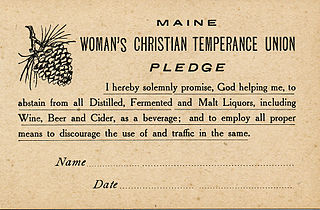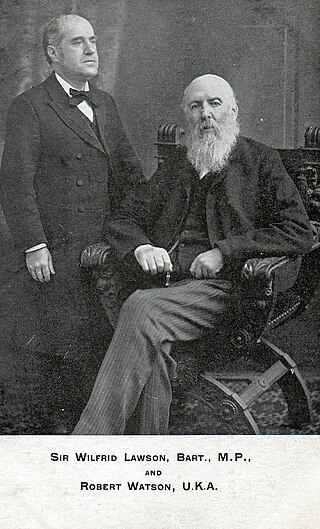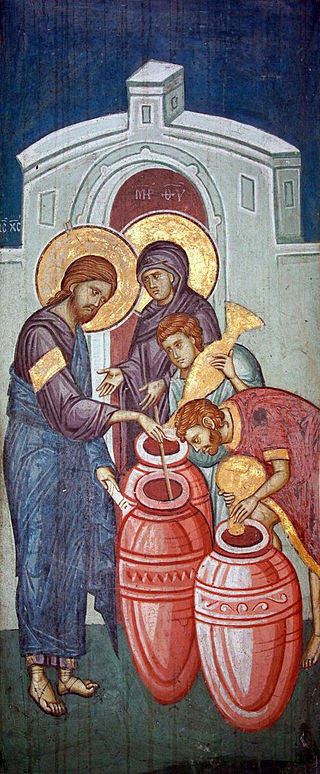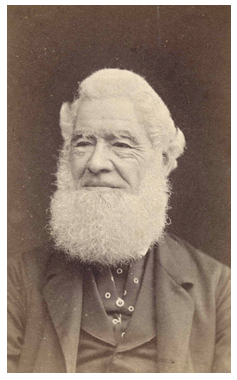
The temperance movement is a social movement promoting temperance or complete abstinence from consumption of alcoholic beverages. Participants in the movement typically criticize alcohol intoxication or promote teetotalism, and its leaders emphasize alcohol's negative effects on people's health, personalities and family lives. Typically the movement promotes alcohol education and it also demands the passage of new laws against the sale of alcohol, either regulations on the availability of alcohol, or the complete prohibition of it.
The Woman's Christian Temperance Union (WCTU) is an international temperance organization. It was among the first organizations of women devoted to social reform with a program that "linked the religious and the secular through concerted and far-reaching reform strategies based on applied Christianity." It plays an influential role in the temperance movement. Originating among women in the United States Prohibition movement, the organization supported the 18th Amendment and was also influential in social reform issues that came to prominence in the progressive era.

Abstinence pledges are commitments made by people, often though not always teenagers and young adults, to practice abstinence, usually in the case of practicing teetotalism with respect to abstaining from alcohol and other drugs, or chastity, with respect to abstaining from sexual intercourse until marriage; in the case of sexual abstinence, they are sometimes also known as purity pledges or virginity pledges. They are most common in the United States among Catholic and Evangelical Christian denominations, while others are nonsectarian.

John Joseph Keane was an Irish-born American prelate of the Roman Catholic Church. He served as the archbishop of the Archdiocese of Dubuque in Iowa from 1900 to 1911. He previously served as bishop of the Diocese of Richmond in Virginia from 1878 to 1888.
The Knights of Father Mathew was a Catholic temperance society founded by Fr Theobald Matthew in Ireland which promoted complete abstinence from intoxicating liquors.
The Anti-Saloon League, now known as the American Council on Addiction and Alcohol Problems, is an organization of the temperance movement in the United States.
The Lincoln–Lee Legion was established by Anti-Saloon League-founder Howard Hyde Russell in 1903 to promote the signing of abstinence pledges by children. The organization was originally called the Lincoln League, named after Abraham Lincoln. However, in 1912 it was renamed the Lincoln–Lee Legion, adding a reference to Robert E. Lee in order to make it more appealing to southern children and their parents.
The American Temperance Society (ATS), also known as the American Society for the Promotion of Temperance, was a society established on February 13, 1826, in Boston, Massachusetts. Within five years there were 2,220 local chapters in the U.S. with 170,000 members who had taken a pledge to abstain from drinking distilled beverages, though not including wine and beer; it permitted the medicinal use of alcohol as well. Within ten years, there were over 8,000 local groups and more than 1,250,000 members who had taken the pledge.

The Temperance Fountain is a fountain and statue located in Washington, D.C., donated to the city in 1882 by Henry D. Cogswell, a dentist from San Francisco, California, who was a crusader in the temperance movement. This fountain was one of a series of temperance fountains he designed and commissioned in a belief that easy access to cool drinking water would keep people from consuming alcoholic beverages.

The United Kingdom Alliance (UKA) was a temperance movement in the United Kingdom founded in 1853 in Manchester to work for the prohibition of the trade in alcohol in the United Kingdom. This occurred in a context of support for the type of law passed by General Neal Dow in Maine, United States, in 1851, prohibiting the sale of intoxicants.

Christian views on alcohol are varied. Throughout the first 1,800 years of Church history, Christians generally consumed alcoholic beverages as a common part of everyday life and used "the fruit of the vine" in their central rite—the Eucharist or Lord's Supper. They held that both the Bible and Christian tradition taught that alcohol is a gift from God that makes life more joyous, but that over-indulgence leading to drunkenness is sinful. However, the alcoholic content of ancient alcoholic beverages was significantly lower than that of modern alcoholic beverages. The low alcoholic content was due to the limitations of fermentation and the nonexistence of distillation methods in the ancient world. Rabbinic teachers wrote acceptance criteria on consumability of ancient alcoholic beverages after significant dilution with water, and prohibited undiluted wine.

In the United States, the temperance movement, which sought to curb the consumption of alcohol, had a large influence on American politics and American society in the nineteenth and twentieth centuries, culminating in the prohibition of alcohol, through the Eighteenth Amendment to the United States Constitution, from 1920 to 1933. Today, there are organizations that continue to promote the cause of temperance.
The temperance movement in the United Kingdom was a social movement that campaigned against the recreational use and sale of alcohol, and promoted total abstinence (teetotalism). In the 19th century, high levels of alcohol consumption and drunkenness were seen by social reformers as a danger to society's wellbeing, leading to social issues such as poverty, child neglect, immorality and economic decline. Temperance societies began to be formed in the 1830s to campaign against alcohol. Specific groups were created over periods of time dedicated to the different aspects of drinking. For example, in 1847, the Band of Hope was created to persuade children not to start drinking alcohol. Most of these temperance groups were aimed at the working class. Temperance was also supported by some religious groups, particularly the Nonconformist Churches. Although the temperance movement met with local success in parts of Britain, it failed to impose national prohibition, and disappeared as a significant force following the Second World War.

Catholic involvement in the temperance movement has been very strong since at least the nineteenth century, with a number of specifically Catholic societies formed to encourage moderation or total abstinence from alcohol.

Teetotalism is the practice of never consuming alcohol, specifically in alcoholic drinks. A person who practices teetotalism is called a teetotaler (US) or teetotaller (UK), or said to be teetotal. Globally, almost half of adults do not drink alcohol. A number of temperance organisations have been founded in order to promote teetotalism and provide spaces for non-drinkers to socialise.

Norman Shanks Kerr was a Scottish physician and social reformer who is remembered for his work in the British temperance movement. He originated the Total Abstinence Society and was founder and first president of the Society for the Study and Cure of Inebriety which was founded in 1884.
The First Woman's National Temperance Convention was a founding event in the establishment of the American Woman's Christian Temperance Union (WCTU).

Cold Water Army was an American temperance organization for children. It was established in 1839 by Rev. T. P. Hunt, who was affiliated with the American Temperance Society (ATS). In its day, hundreds of thousands of children belonged to the society. The movement attained its height in 1843, but interest was diminished by the Washingtonian movement, whose members absorbed almost the whole attention of the temperance movement community. Yet for several years, these youthful organizations continued to exist in various locations. Even as late as 1862, some of these societies were known to be active.

The National Temperance League was a British organisation established in June 1856, through an amalgamation of two others: the National Temperance Society and the London Temperance League. Its Presidents included Samuel Bowly, Edward Long Fox, and Wentworth Leigh.











